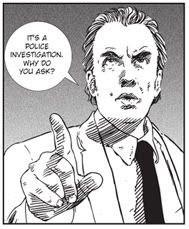Authors and the Gloomiverse
Tuesday, 25 June 2013 at 12:58
I used to tease her about this, but in recent years I've increasingly strayed over to her viewpoint. I used to believe that whatever the author of a work wrote, particularly when that author created the characters in the first place, then that should be considered the 'truth' of that story - the 'canon', as some will prefer to call it.
This becomes problematic when certain works, which have (up to a point) been particularly wonderful, suddenly mutate alarmingly into something decidedly rubbish or just plain wrong. Should we simply shrug our shoulders when these things happen, or does it make more sense to acknowledge that everyone can make a mistake, and that we should choose to end the story where it feels right for us, consigning whatever follows to an alternate universe, in which all stories have crappy, miserable, dreary endings? The Gloomiverse, maybe.
Some cases in point.
The tv series 'Lost' was hugely popular. Year by year it had built up an audience who thoroughly enjoyed the world-building and looked forward to a time when all the loose ends would be tied up, and when we would acknowledge it as one of the finest series ever made. And then along came Series Six. Despite assurances all along from the writers and the producers, who had reassured the fans that they had known the ending to the series all along and that all questions would be answered, the final series was an incoherent mess, half of which turned out to be an after-death illusion taking place in Heaven, or somewhere. Isn't this, therefore, a prime candidate for the idea that Series Six should be forgotten, dismissed, assumed to be apocryphal? That certainly works for me.
It can happen in comics, too. Cerebus lasted 300 issues, and never failed to be amazingly drawn, hugely intelligent and never afraid to be controversial. Right up until the end of 'Guys', the series made rational sense, the characters in the service of the overarching plot. Sim ended 'Rick's Story' with the return of Jaka, and off they walked into the sunset, an uncertain future ahead of them (particularly in view of Sim's well-known belief that a happy relationship was pretty much impossible). All fair enough.
For me, this is where the series ends - I'd rather not know how it all turned out. Better, surely, to allow the reader to judge for himself whether Cerebus was being as foolish as his friend Bear (and arguably, he was - Sim had already put forward a persuasive argument along these lines). Instead, we got 69 further issues of awful things happening, the (to Sim, inevitable) break-up of the relationship, long and dreary treatises on F Scott Fitzgerald and Ernest Hemingway, the missed death of his parents, followed by issue after issue of Bible commentaries for two or three years, all entirely at odds with the previous storyline.
When an author stumbles as badly as this, is this again another argument for allowing the story to finish at the end of Rick's Story (much of which also never really led anywhere interesting plot-wise) and chalk it up to a massive misstep on the part of the author? We miss a couple of hundred years of Cerebus's life in favour of reams and reams of Bible commentaries. Yes, it was drawn sumptuously and written with great skill - but when this talent is geared towards rampant bible-bashing and furthering Sim's own unsympathetic thoughts on relationships (persuasive or not) instead of actually writing any kind of plot, should it be consigned to apocryphal stories again?
I say yes. If sometime in the future you read a Harker story in which our hero falls in love, becomes a wizard and fires Critchley, replacing him with a basset hound, and then winds up working in a monastery, I would encourage you all to shun me, to consign those stories to the realm of the (not-so) fantastic, and to remind me what you liked about the series in the first place.
Let me know about any other such examples - we need a list, I think! Works of greatness that then went all cockeyed!








0 Comments:
Post a Comment
<< Home